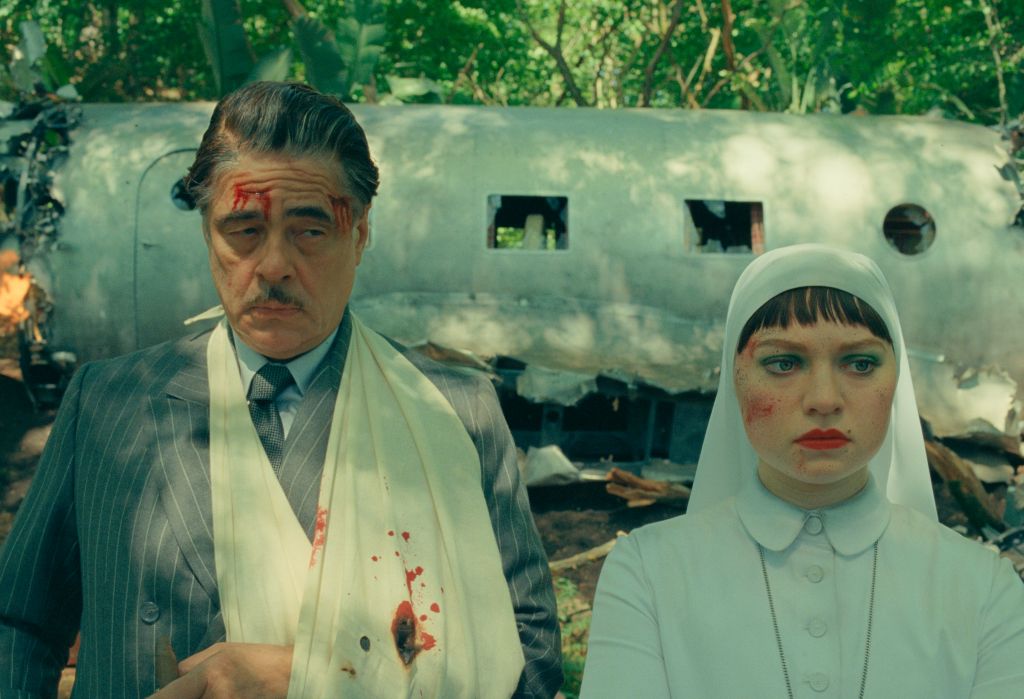Reviews include M3GAN 2.0, Familiar Touch, and I’m Your Venus.
TFCA Friday: Week of June 6
June 6, 2025

Welcome to the TFCA weekly, a round-up of reviews and coverage by members of the Toronto Film Critics Association.
In Release this Week
Ballerina (dir. Len Wiseman)
“Missing in action, literally, (but staying on as producer) is stunt master Chad Stahelski, who directed the first four movies and whose connection with Reeves back to The Matrix made their relationship almost telepathic,” notes Jim Slotek at Original Cin. “By now, relentless killing is practically a learned film science. What appears to matter is who’s doing it. Fueled by familiar faces, and de Armas’s commitment to her role, Ballerina is, at least, a little extra Wick for fans who thought they’d seen the last of him.”
“Ultimately, Ballerina is a solid piece of action spectacle cinema but it never adds the heart that made us get emotionally invested in all this nonsense in the first place,” admits Dave Voigt at In the Seats. “Sure we’re rooting for Eve Macarro, but even when she’s standing in the same scene as John Wick, she’s not given the tools to even be able to stand in the shadow of what made the Baba Yaga (aka Wick) so damn emotionally compelling from the get go. For that go rent or buy Wick is Pain; the behind the scenes doc on the franchise now on VOD.”
“For every moment that does work – such as when Eve and an anonymous foe go Greek, smashing each other atop the head with enough dinner plates to inspire a thousand ‘Opas!’ or when Eve tosses grenade after grenade to a horde of henchmen – there are a half-dozen more that fail to raise the pulse,” says Barry Hertz at The Globe and Mail. “De Armas is clearly committed to keeping the stakes high, even if the script fails to offer the full charm offensive she displayed in No Time to Die. But everyone else seems to be either wasted (Byrne, McShane, Reeves, a blink-and-miss-him Norman Reedus) or impatiently waiting for their cheque to clear (mostly Huston, who seems to be pulling a Mission: Impossible-era Ving Rhames move by refusing to ever stand up).”
Dangerous Animals (dir. Sean Byrne)
“In pairing with the undeniable mood of it all this whole thing works because star Jai Courtney is let off the chain to deliver a charming, sleazy and ultimately terrifying performance as our killer who enjoys watching his victims be eaten by the sharks below while dancing around his boat to the sounds of Stevie Wright,” writes Dave Voigt at In the Seats. “At first glance, Hassie Harrison could have been mistaken for a low rent Jennifer Lawrence type, but she brings the ‘final girl’ energy pretty early on in this film and it’s all an absolute delight to watch as she engages in psychological warfare with her capture.”
“It’s all claustrophobic and terrible and … wildly entertaining. As always, director Sean Byrne (The Loved Ones) goes above and beyond the requirements of the genre,” says Liz Braun at Original Cin. “Dangerous Animals is full of interesting surprises — breathtaking footage of the ocean, arresting musical choices, flashes of deep, unexpected emotion. Tucker is a bit of a comic, as killers go, often joking around with his victims, and the storytelling moves seamlessly — and disturbingly — between slapstick and sickening. Watching a shark-feeding frenzy is one thing; watching a nanosecond of the passion on a killer’s face as he witnesses a victim expire is something else.”
“Courtney delivers a knowingly gonzo performance as Tucker, blazing past his history of ho-hum Hollywood heroes (Terminator Genisys, Suicide Squad, Divergent) to deliver a truly inspiring villain whose insanity knows no bounds,” writes Barry Hertz at The Globe and Mail. “While Lepard and director Sean Byrne briefly flirt with overanalyzing Tucker’s psychosis – as a child, Tucker was attacked by sharks, though he seems to blame his parents more than the sea creatures – the filmmakers mostly let their leading man to go fully, madly unhinged. The actor is a megalodon of mania, chewing up the screen with the strength of more than a dozen great whites. Someone lock Courtney and Gerard Butler in the same shark cage, and see who emerges alive.”
“Jai Courtney is the MVP of Sean Byrne’s serial killer and sharks thriller,” notes Joe Lipsett at The Queer Gaze.
“Courtney showcases a serial killer unlike any other in the way he plays this unhinged yet likeable persona,” agrees Marriska Fernandes at Exclaim!. “He can be found singing ‘Baby Shark’ with impeccable comedic timing to soothe nervous divers before their fateful cage dive, or wildly dancing in his underwear, pumped by the adrenaline of a fresh kill. His character’s penchant for filming his victims being dismembered adds another layer of gruesome depravity.”

Digital Tsunami: Big Tech, Big A.I., Big Brother (dir. Fred Peabody 🇨🇦)
“The film’s exploration of A.I. proves both timely and productive,” writes Pat Mullen at POV Magazine. “The immediate implications of tools like Chat GPT raise concerns of media literacy and the ability to discern real from fake. With Peabody’s All Governments Lie sounding the alarm about the era of fake news in 2016, chillingly grasping what was about to unfold in a film that predated Trump’s election, it’s really quite alarming to see just how quickly the field has accelerated.”
I Don’t Understand You (dir. David Joseph Craig and Brian Crano)
“Despite featuring two gifted comedic actors, the one-joke film is repetitive and unfunny,” says Joe Lipsett at The Queer Gaze.
“The film has its funny moments, but writers and directors David Joseph Craig and Brian Crano — a real-life couple with their own adopted son — can’t maintain a consistent tone. Are Dom and Cole stereotypical clueless Americans, or potential killers who just haven’t met the right victim?” asks Chris Knight at Original Cin. “A sudden swerve in their motivations late in the film had me wondering whether I should even be rooting for them. And the ending felt oddly unplanned, merely tacked on.”
“The film blends elements of horror (there is some killing going on) and comedy. Overall, the comedy is not terribly funny or as black as desired, though the comedy can be described to be amusing at best,” admits Gilbert Seah at Afro Toronto. “Kroll and Rannells do well as the gay couple, with the film taking a generally positive attitude towards LGBT+ issues, despite the story’s setting in rural Italy. But the film has a mean-spirited tone as can be witnessed not only in the characters killed but an innocent Italian arrested for the murders he never committed.”
K.O. (dir. Antoine Blossier)
“Overall, the cliché-laden K.O. combines elements of martial arts action and drama, the most outstanding being the intense fight sequences,” writes Gilbert Seah at Afro Toronto. “The subplot with Bastien working with a reluctant Kenza (the cop) makes a distraction, though a clichéd one.”
Ocean with David Attenborough (dir. Colin Butfield, Toby Nowlan and Keith Scholey)
“Contemporary nature documentaries take place in an ecological war zone, and Ocean is no exception. Attenborough says an area about the size of the Amazon rainforest is destroyed each year by mega-trawlers, which can reduce a century-old ecosystem to silt in a day, while tossing out three-quarters of what they catch,” writes Liam Lacey at Original Cin. “Thanks to public awareness and pressure, the world’s whale populations are slowly recovering. Somewhere out there, Attenborough notes, a new blue whale will be born and, with luck, will see what the next hundred years brings.”
The Phoenician Scheme (dir. Wes Anderson)
“[A] frustrating, crushing disappointment,” admits Barry Hertz at The Globe and Mail. “In a way, The Phoenician Scheme is a ruse itself – Anderson’s bold gamble with other people’s money to play around with his favourite performers (Tom Hanks, Bryan Cranston, Jeffrey Wright, Scarlett Johansson, Mathieu Amalric) as if they were action figures made of porcelain, reconfigurable but delicate. By the time that Bill Murray shows up as God Himself, then the game has been long given away.”
“Wes Anderson has created a hermetic world that appeals to cinephiles, film critics, intellectuals, poseurs, fashionistas, and lovers of black comedy,” says Marc Glassman at Classical FM. “His films look gorgeous; they’re beautifully designed in a modernist fashion. A recent article in the blog Atlas Obscura offered 15 places to visit that resemble Anderson films: they range from an Icelandic lighthouse to a Cincinnati Ice Cream parlor. Anderson is a visual artist. Perhaps he’s masquerading as a filmmaker. In any case, The Phoenician Scheme is a film that some will love, others will hate and none should ignore.”
“This infrastructure caper seems odd for Anderson. Del Toro is perfectly fine and so is Threapleton, but they lack the exuberance of Ralph Fiennes in The Grand Budapest Hotel, Anderson’s finest work, or the wicked smirk of the filmmaker’s longtime muse Murray,” says Peter Howell at the Toronto Star. “Cera delivers the nutty yuks we used to expect of Anderson, back when his films were a novelty and not a factory issue. The Canadian-born actor evidently impressed the maestro, because at a Cannes Film Festival press conference, Anderson promised to hire him again for a future film. They sealed the deal with a handshake. There was no grenade in either palm.”
“The film as like his previous two films, boasts meticulously crafted sets and a whimsical visual style that should delight his fans,” adds Gilbert Seah at Afro Toronto. “Needless to say, there is always something at the corner of every scene that will surprise. But Anderson does not care about scientific accuracy. The scene in which a plane in flight has its window smashed open does not result in Korda [being] sucked out of the plane. Another is the quicksand segment in which Korda sinks into the quicksand with only his head above the quicksand.”
“If there’s a real find among all the nick-knacks, though, it’s Threapleton. The young star shares little resemblance with del Toro, but Threapleton proves a dead ringer for her famous mother, Kate Winslet,” says Pat Mullen at That Shelf. “Audiences should quickly stay any nepo baby charges though. Mia has Kate’s acting genes. She’s a natural comic and a terrific screen presence. Threapleton gels amicably with the many co-stars of The Phoenician Scheme’s sprawling ensemble, too. Her chemistry with del Toro plays wonderfully tit-for-tat as father and daughter amicably push each other’s buttons. There’s a sense of play here as del Toro clearly knows the calibre of his young co-star and coaxes Threapleton to excel.”
The Ritual (dir. David Middel)
“The Ritual‘s central didactic instruction isn’t to believe in a higher power. Instead, it’s an absurdly specific, fearfully atavistic and almost despairingly cruel directive not to listen to the voice of reason in the face of fatal consequences,” says Jackson Weaver at CBC. “If it were made with even a modicum of artistry, the film may have run the risk of sparking a roaring prairie fire of collective madness. Something this insidious, made proficiently, could well have become another Michelle Remembers, the Canadian ritual-abuse memoir so incorrect and inflammatory it set off the Satanic panic.”
“A subdued Al Pacino and an accent-challenged Dan Stevens can’t save a by the numbers exorcism film,” groans Joe Lipsett at The Queer Gaze.
“Stevens and Pacino are largely wasted in their terrible roles, performances best forgotten,” agrees Gilbert Seah at Afro Toronto. “Cowen’s sweaty performance is the typical clichéd one expected in an exorcism movie where the actress changes tone in voice and spews out vulgarities. The film is just one large exorcism segment, one exorcism scene after another, increasing in intensity, but not intelligence or coherence.”
Straw (dir. Tyler Perry)
“Good intentions aside, Tyler Perry’s Straw tries too hard to get the message across,” observes Gilbert Seah at Afro Toronto. “At the film’s start, the audience is shown all the worst that can happen to the single mother. She needs to get her sick daughter the $40 lunch money, pay her rent or get evicted, get abused at work by both customer and supervisor and almost had her bank account closed with only $47 left in the bank. It is all too much to believe and take, though credit is given to Henson for trying so hard.”
File Under Miscellaneous
At the Toronto Star, Peter Howell offers five films to look forward to in June as summer movie season heats up, including Celine Song’s Past Lives follow-up, Materialists starring Dakota Johnson, Pedro Pascal, and Chris Evans: “It’s being billed as ‘a modern take on what true love is really worth.’ Three magnetic leads and a rom-com plot that actually tries to mean something — how novel!” writes Howell.
At What She Said, Anne Brodie offers stream picks for Indigenous History Month and Pride Month, including Feather Fall and Parade.
At The Globe and Mail, Barry Hertz assess this year’s Canadian Screen Awards. “While the Canadian academy says it constantly reevaluates its nomination and voting process every year, this edition’s winners – as well as the titles that walked away with little or no hardware – suggest a top-to-bottom overhaul is needed for 2026. How, for instance, did David Cronenberg’s The Shrouds – easily the best Canadian film of the year – only leave the CSAs with two awards (for best sound mixing and sound editing)?” asks Hertz. “Different strokes for different folks, I suppose, but Cronenberg’s, Egoyan’s and Rankin’s latest works are beloved by critics and audiences alike, here and abroad. Giving the three of them something of a cold shoulder feels dispiriting and confounding.” Hertz also has an early look at the Canadian film Boxcutter.
A Festival of Festival Coverage
At The Globe and Mail, Barry Hertz reports on TIFF’s announcement that John Candy: I Like Me will open this year’s festival. “The doc, which will stream on Prime Video after its TIFF premiere, is just one of two Candy-centric projects debuting this fall. In October, Canadian author Paul Myers, brother of actor Mike Myers, will release the comedian’s new biography John Candy: A Life in Comedy with House of Anansi Press.” Hertz also has an early look at the Toronto Jewish Film Festival’s closing night film about Charles Grodin.
At Classical FM, Marc Glassman previews imagineNATIVE, which features Toronto encores of docs like #skoden and Singing Back the Buffalo: “Singing Back the Buffalo is a beautifully shot film. It’s one of tender emotions as one sees the reaction of Indigenous people to the sights and sounds of the returning buffalo. Hubbard has made a film of hope and reclamation, which has won awards and should be widely seen.”
TV Talk/Series Stuff
At What She Said, Anne Brodie takes in the finale of Harry Wild: “[Jane] Seymour and [Rohan] Nedd make a terrific team with their unique chemistry and the offbeat plotlines are intriguing.” Jane Seymour pulls double duty in the column by hosting Relative Secrets: “The show team seeks to find the answers, and the positives because they are everywhere. An unusual, sometimes sordid and interesting premise,” writes Brodie. And there’s a surprising investigation in American Cats: “a shocking exposé of a common and highly profitable but damaging procedure, the declawing of cats.”
As Emmy campaigns kick into high gear, Dave Voigt cuts to the chase with some of the film editors behind some of this year’s hits, like Matthew Barbato of Only Murders in the Building and Todd Downing and Amelia Allwarden of Overcompensating.



